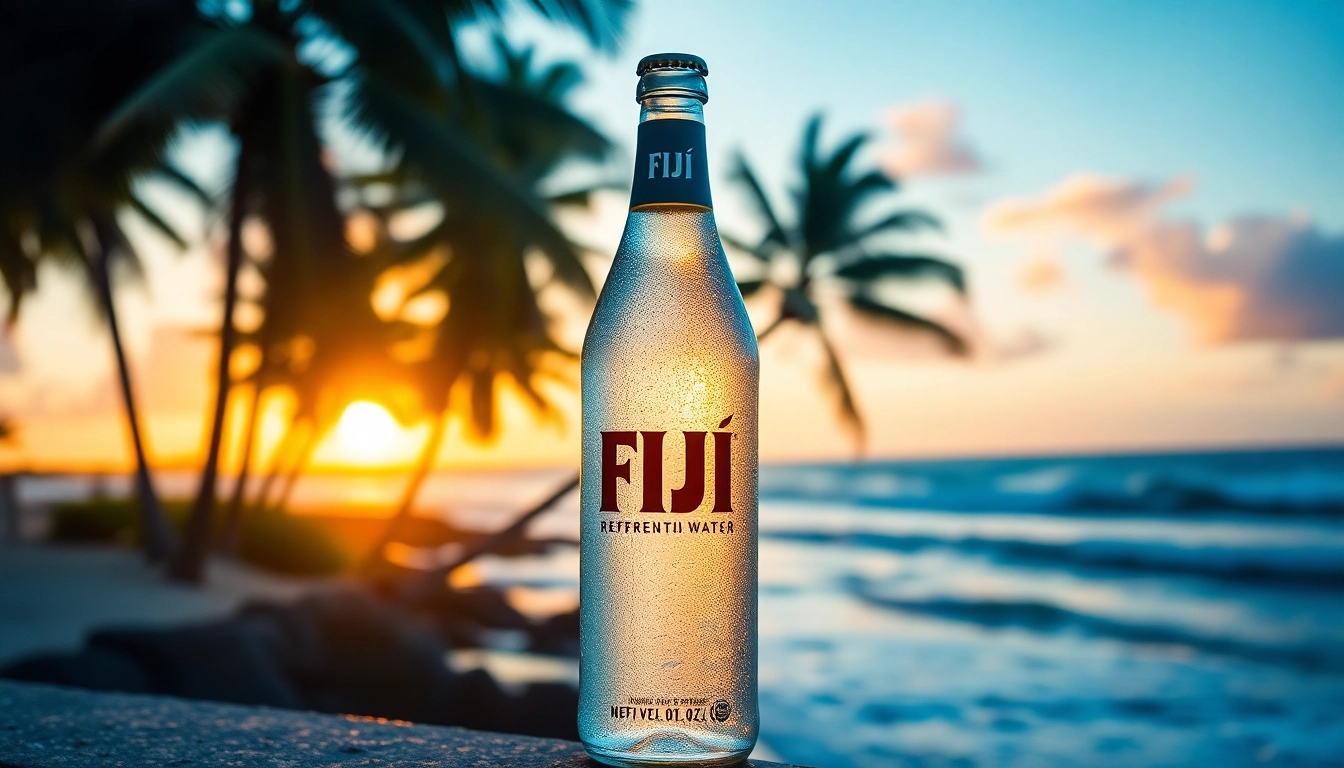The Origin of Fiji Water
Fiji Water is not just bottled water; it is a symbol of purity that has captured the hearts of consumers around the globe. Sourced from the remote Yaqara Valley in Viti Levu, Fiji, this naturally occurring artesian water has a unique journey and set of characteristics that distinguish it from other bottled waters. As a testament to its quality, Fiji Water is marketed as “Earth’s Finest Water,” and today we delve into its origins, benefits, taste, market presence, and the controversies surrounding it. By understanding its intricate journey, consumers can appreciate the value of fiji water more fully.
1. The Artesian Aquifer in Viti Levu
The origins of Fiji Water can be traced back to a natural artesian aquifer situated deep within the lush, volcanic landscape of Viti Levu. Rainwater from tropical storms filters through layers of volcanic rock, a process that takes over 10,000 years. This filtration occurs in a protected environment, which enhances its mineral composition and purity. The unique geology contributes vital minerals such as calcium and magnesium, making Fiji Water a compelling choice for hydration.
The aquifer from which Fiji Water is sourced is surrounded by dense rainforest, providing a natural barrier against contamination and ensuring the water remains pristine. This aspect is especially pertinent when considering the environmental impacts of bottled water production globally.
2. Sustainability Practices in Extraction
In an age of increasing environmental awareness, Fiji Water has committed itself to sustainable practices. The company emphasizes its responsibility towards both the environment and the local communities. Water extraction is monitored and regulated to ensure that the aquifer maintains its water levels and ecological balance. Through responsible management, Fiji Water aims to strike a balance between profit and environmental stewardship.
Moreover, Fiji Water is packaged using materials that reduce its carbon footprint. The brand actively participates in sustainability campaigns, including initiatives to reforest parts of Fiji. Such practices not only help in preserving the local environment but also enhance the brand’s image as a responsible corporate entity.
3. Journey from Source to Bottling
The journey of Fiji Water from the aquifer to the consumer involves several stages, each maintained to ensure quality. After extraction, the water undergoes rigorous testing and quality checks. The bottling facility, located close to the source, minimizes transportation impacts, further preserving the water’s pristine nature.
This facility is designed to adhere to strict hygiene protocols, ensuring that the water is bottled at the source and directly transported to market. The iconic square bottle design not only stands out on shelves but is also engineered for optimal efficiency in packaging and transportation. Each bottle reflects a commitment to quality and environmental consciousness, making it a preferred choice among discerning consumers.
Health Benefits of Fiji Water
The allure of Fiji Water transcends its taste and origin; its health benefits are often highlighted in discussions surrounding this exquisite product. Many health enthusiasts claim that the mineral content contributes to superior hydration. Let’s explore the health benefits associated with Fiji Water in detail.
1. Mineral Content and Hydration
Fiji Water is known for its unique mineral composition, which is one of its selling points. With a Total Dissolved Solids (TDS) level of 222 mg/L, it contains essential minerals such as calcium (18 mg/L), magnesium (15 mg/L), and silica (93 mg/L). Silica, in particular, is touted for its potential benefits to skin, hair, and bone health.
Research suggests that water enriched with minerals can enhance hydration. The presence of calcium and magnesium may assist in muscle function, and adequate hydration is paramount for maintaining overall health. Fiji Water offers a refreshing taste that encourages individuals to hydrate efficiently, making it an excellent choice for both everyday consumption and active lifestyles.
2. pH Balance and Health Claims
Fiji Water boasts a slightly alkaline pH level of around 7.7, which many proponents claim may aid in neutralizing acidity in the body. This pH balance plays a role in claiming that Fiji Water is healthier than regular tap water or other bottled waters.
Additionally, consumers have highlighted the potential benefits of an alkaline diet, which may promote better digestion and overall health. While substantial scientific support is still needed to claim definitive health benefits, the unique mineral balance certainly positions Fiji Water favorably in discussions about hydration and overall wellness.
3. Different Bottled Variants
Fiji Water is available in several sizes, including convenient options such as 500 mL, 1 L, and 1.5 L bottles. These variants cater to different consumer needs, whether it’s for convenient on-the-go hydration or larger family-sized options. Each bottle, irrespective of size, retains the iconic look and maintains the quality that Fiji Water is known for.
These options make it easy for users to integrate Fiji Water into their daily routine, whether during workouts, at picnics, or at home. With its appealing packaging and health benefits, Fiji Water continues to stand out in the crowded bottled water market.
Understanding Fiji Water’s Unique Taste
Taste is a crucial factor that influences consumer preference, and Fiji Water has developed a reputation for its smooth and refreshing flavor. Let’s unravel what gives Fiji Water its unique taste and why consumers are drawn to it.
1. The Role of Volcanic Filtration
The volcanic rock filtration process plays an essential role in imparting a unique flavor profile to Fiji Water. As rainwater filters through layers of volcanic rock, it absorbs valuable minerals that contribute to its distinct taste. This natural filtration intrinsic to the region of Fiji enhances the mouthfeel and smoothness, cultivating a refreshing drinking experience.
Additionally, the remoteness of the aquifer ensures that the water remains untouched by pollution and additives, further enhancing its pure flavor. This authenticity is appealing to consumers who seek natural and unspoiled hydration options.
2. Electrolytes and Flavor Profile
The mineral content in Fiji Water, particularly its high silica and trace mineral content, contributes to its clean, smooth flavor. Silica is often cited for imparting a taste that is less metallic than many other bottled waters, making Fiji Water a preferred option for water connoisseurs.
Electrolytes, such as calcium and magnesium, not only provide health benefits but also contribute to the taste. The balance of these electrolytes can make Fiji Water taste more appealing, especially when compared to water with high sodium levels or chemical treatments.
3. Consumer Preferences and Feedback
Consumer feedback on Fiji Water consistently emphasizes its smooth texture and refreshing flavor. Reviews often highlight how it doesn’t leave a chalky aftertaste that some bottled waters do. Many consumers have expressed a preference for Fiji Water over others, citing its unique taste and understanding of its health benefits.
Moreover, Fiji Water has adeptly utilized social media platforms to capitalize on its branding, garnering a youthful, trendy image that reinforces its status as a premium bottled water option.
The Market for Fiji Water
Fiji Water operates within a competitive bottled water market that sees a plethora of brands vying for consumer loyalty. Understanding how Fiji Water fits into the broader market landscape is crucial for comprehending its positioning and success.
1. Price Comparison with Other Brands
Fiji Water is often considered one of the more premium bottled water brands, with pricing reflecting its unique characteristics and eco-conscious practices. Generally, a 500 mL bottle of Fiji Water can range around $1.99 to $3.00, depending on the retailer and region.
When compared to competitors such as Dasani or Aquafina, which usually range from $0.99 to $1.50 for similar sizes, Fiji Water does carry a cost premium. However, for many consumers, the perceived health benefits, taste, and ethical sourcing justify this higher price point.
2. Availability and Distribution Channels
Fiji Water is distributed through a wide array of channels, including grocery stores, convenience stores, online retailers, and restaurants. The brand has established itself in high-end venues, hotels, and even in major airline operations, where premium products are available. Such a diverse distribution strategy ensures widespread availability, appealing to both casual consumers and those seeking premium hydration.
Online shopping options expand its reach even further, making it convenient for customers to source their favorite bottled water directly. The growing trend towards online shopping has allowed Fiji Water to maintain its presence and visibility in a rapidly evolving market.
3. Fiji Water’s Global Reach
Since its introduction in 1996, Fiji Water has expanded its footprint globally, currently sold in over 60 countries. Its unique branding and marketing focus on purity, sustainability, and health benefits appeal broadly, allowing it a vast international market. Fiji Water’s global reach is facilitated by strategic partnerships with distributors and retailers interested in premium products.
The brand effectively leverages its image of luxury and wellness, carving out a niche among consumers who prioritize high-quality, health-conscious products. This positioning enables Fiji Water to maintain a strong competitive edge even as newer brands enter the market.
Controversies and Challenges
While Fiji Water has enjoyed tremendous popularity since its inception, it has also faced its share of controversies and challenges. Navigating these issues is crucial for the brand’s sustainability and image moving forward.
1. Environmental Concerns
Concerns regarding the environmental impact of bottling water from a pristine aquifer have been a significant talking point. Critics argue that extracting natural resources can harm local ecosystems and limit water availability for local communities. Fiji Water has countered these claims by emphasizing its commitment to sustainability and community development.
The company has made strides in engaging with local communities and bolstering eco-friendly initiatives, but the debate often hinges on the accessibility of water for locals versus the commercial sale of that water to international consumers.
2. Recent Recalls and Safety Issues
Fiji Water faced scrutiny in 2024 due to a recall of nearly 1.9 million bottles of its 500 mL size. The FDA reported contamination from bacterial genera and elevated manganese levels, leading to concerns about consumer safety. This recall put the brand’s reputation in jeopardy and highlighted vulnerabilities in their production and safety processes.
In response, Fiji Water stated its commitment to quality control and transparency, implementing additional safeguards to restore consumer trust. As consumers become more informed and concerned about health issues, such oversight becomes increasingly crucial.
3. The Future of Fiji Water
Looking ahead, Fiji Water must navigate a mix of opportunities and challenges as it continues to expand its market. The rising awareness about sustainability can support the brand’s growth if matched with genuine practices and commitment. The incorporation of eco-friendly measures, such as biodegradable packaging or carbon-neutral delivery methods, could enhance its brand image.
Additionally, as health trends evolve, Fiji Water must continuously engage with its audience and adapt its messaging. Innovation in product offerings or marketing strategies may prove invaluable as consumer preferences shift toward more health-centric products. Ultimately, consumer education about the brand’s benefits and values will play a critical role in its success moving forward.



